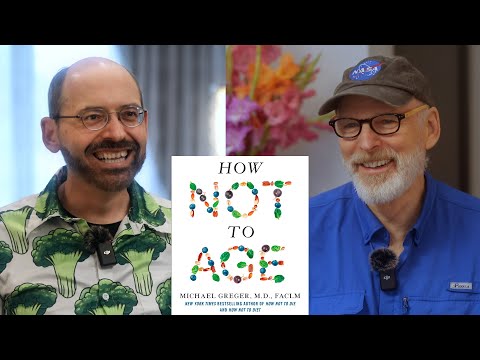Elite Human Capital wins, in the end ![]()
![]()
I am back to being a Michael Gregor fanboy.
Time to read the book.
The best longevity books 00:00
-
The author has read over a dozen longevity books and is drawn to authors who are credible scientists, with six favorite authors who are respected researchers, 00:00
-
The diets recommended by these authors have a lot in common, including being high in plants, low in red meat, and low in processed foods, 00:39
-
The centenarian diet is similar to the Mediterranean diet, with a focus on whole, unprocessed foods, 00:57
The worst longevity books 01:50
-
Some longevity books are motivated by profit and tell people what they want to hear, rather than providing accurate information, 01:50
-
Certain authors, such as David Sinclair, have been controversial in scientific circles, and their claims may not be supported by evidence, 02:08
-
Books that dismiss or oversimplify certain branches of science, such as epidemiology, may not be reliable sources of information, 02:27
How Not To Age 03:45
-
The book “How Not to Age” is a comprehensive guide to longevity, with a focus on diet and over 600 pages of small print, 03:45
-
The book has over 13,000 references, which can be accessed online, and is written in a clear and consistent manner, 04:04
-
The author’s own experience with a plant-based diet and lifestyle has been positive, but they acknowledge that individual results may vary, 05:03
Fact checking Dr. Greger 06:23
-
The author has fact-checked Dr. Greger’s previous book, “How Not to Die”, and found it to be well-researched and accurate, 06:23
-
Dr. Greger has a team of fact-checkers, including a full-time fact-checker on staff, to ensure the accuracy of his books, 07:34
-
The author interviewed Dr. Greger in person and discussed the importance of fact-checking and having a ruthless fact-checker, 07:53
Why a book on aging 08:24
-
The book “How Not To Age” was written because the author realized that aging is a prime risk factor for many leading causes of death, such as heart disease, cancer, and dementia 10:31
-
The author was inspired by a consensus conference paper that identified pathways to slow down aging, and realized that diet and lifestyle interventions could address these pathways 11:14
-
The book took years to write, with over 13,000 citations, and was initially too long, with over 1,200 pages, before being condensed to 600 pages 12:28
Book creation and audience 13:42
-
The author had to remove hundreds of thousands of words from the book and create special videos to link to in the book, covering the removed material 13:24
-
The author assumed the audience would be middle-aged folks starting to notice health changes, and also wanted to make the book accessible to a medical audience 14:02
-
The author learned many new concepts while writing the book, such as microRNAs, which were not even discovered when they graduated from medical school 14:40
The main pathways of aging 15:14
-
The science of aging is explained in the book, including the use of technical terms, with the aim of making it accessible to readers 15:14
-
The book provides summaries at the end of each section, allowing readers to skip to the practical steps if they don’t want to learn about the technical details 15:33
-
Some readers may find the chapter headings intimidating due to the use of technical terms like serans and mtor, but the book aims to explain these concepts in an understandable way 16:13
Writing the book 16:29
-
The author’s agent was concerned that the book would be too long and intimidating, but the author wanted to include everything and make it a comprehensive reference book 16:47
-
The author mentions that they learned new things while writing the book, including the importance of chronobiology and the role of circadian rhythms in disease processes 18:59
-
The author had to revise some of their previous recommendations based on new information, and they appreciate the opportunity to correct their mistakes 19:33
Key takeaways 19:52
-
The author identifies epigenetics as a fascinating topic, but autophagy as a chapter with many practical takeaways for daily life 20:11
-
The author suggests that the mtor chapter may be the most important for health, as it has a significant impact on many aspects of aging 20:35
-
The author notes that diet is likely more important than sleep, exercise, and stress in terms of longevity, although these factors can still have significant effects on healthspan 21:16
Recording the audiobook 23:13
-
The author spent over 40 hours recording the audiobook, and had to be mindful of their herbal tea consumption to avoid any adverse effects 23:34
-
The author is glad to have had the opportunity to narrate the audiobook, and appreciates the chance to share their sense of humor and personality with listeners 24:08
Hormesis 25:28
-
Plants have developed defense mechanisms to protect themselves from being consumed, and these mechanisms can be beneficial to humans through a process called hormesis, where small stresses can make the body stronger 25:28
-
Examples of hormesis include exercise, which puts stress on the body, and green tea, which is a prooxidant that ramps up the body’s antioxidant defenses 26:39
-
Plants have co-evolved with humans and have developed antioxidant defenses that can be hijacked by humans to improve their own health 28:02
Is Dr. Greger biased? 29:48
-
The concept of bias is discussed, and it is argued that a person’s diet or lifestyle does not automatically disqualify their opinions or research 29:48
-
The importance of looking at the science and the quality of the research is emphasized, rather than the person’s potential biases 31:02
-
The problem of poor-quality research studies is acknowledged, and the need for critical evaluation of the literature is stressed 31:59
Alzheimer’s 34:49
-
Alzheimer’s disease is the most feared disease of aging, with high levels of saturated fat and copper being particularly detrimental to the brain 36:06
-
Having a cholesterol level of 225 or higher increases the odds of developing Alzheimer’s disease, with a focus on LDL mechanisms 36:23
-
Saturated fat is correlated with increased blood-brain barrier leakiness, and a high-saturated fat meal can impair cognitive function within hours 37:21
Diet and Prevention 38:01
-
The focus of anti-dementia strategies is on whole plant foods, with an emphasis on greens and berries 38:21
-
A ketogenic diet high in saturated fat can be harmful to the brain, but a diet low in saturated fat and high in polyunsaturated and monounsaturated fats may be less concerning 38:58
-
Long-term vegetarians have up to three times lower rates of dementia in older age, possibly due to lower saturated fat intake and other factors 39:18
Blood Sugar Control 40:35
-
Insulin sensitivity is a key indicator of long-term blood sugar control, and high-saturated fat diets can decrease insulin sensitivity 40:53
-
Eating high amounts of carbs is not necessarily harmful if insulin sensitivity is good, and legumes are a food group associated with longevity 41:47
Protein 41:53
-
The anti-aging diet is about protein restriction, reducing protein intake to recommended levels to boost the longevity hormone, suppress the engine of aging, and decrease the cancer-promoting growth hormone 42:31
-
Reducing protein intake, particularly from animal sources, can decrease the amino acid methionine, which is associated with aging and cancer 42:51
-
Adding protein powder to food can be harmful, as it exceeds the recommended daily protein intake, which is 0.8 grams per kilogram of body weight for people under 65 43:49
Anti-Aging Diet 44:08
-
Even people eating strictly plant-based diets tend to consume 30% more protein than needed, which can be detrimental to longevity and metabolic health 44:08
-
Adding protein supplements does not benefit muscle strength, mass, or performance in older individuals, regardless of whether they have sarcopenia or not 44:30
-
Randomized control trials have shown that reducing protein intake to 0.8 grams per kilogram of body weight has no negative effect on muscle strength or mass in older people 45:11
Omega-3s and Cognitive Health 46:05
-
Long-chain omega-3s, such as DHA and EPA, may slow down brain shrinkage and improve cognition in older people, but it is recommended to obtain them from pollutant-free sources, such as algal oil 46:05
-
Eating fish, especially smaller, shorter-lived species, can provide omega-3s, but it is essential to consider the risk of pollution and mercury contamination 46:23
Antioxidants and Supplements 47:36
-
High doses of isolated antioxidants, such as vitamin E and beta-carotene, can shorten lifespan and increase the risk of certain diseases, such as lung cancer 47:36
-
A balanced diet rich in whole foods, including vegetables and fruits, provides a synergy of antioxidants and phytonutrients that is more beneficial than supplements 49:07
Browning/cooking food 49:54
-
Cooking can destroy some heat-sensitive nutrients like vitamin C, but it can also make other nutrients more bioavailable, such as lycopene in tomatoes 49:54
-
Carotenoids are fat-soluble, so they require a source of fat to be absorbed, and green light sources of fat from whole plant foods are recommended 50:51
-
Cooking methods like steaming, boiling, and poaching are preferred over dry heat methods like grilling, baking, and frying to reduce the formation of advanced glycation end products 53:42
Advanced glycation end products 53:42
-
Advanced glycation end products are formed when meat is exposed to high dry heat temperatures and can cause inflammation and oxidative stress 53:42
-
Even steamed chicken can cause some inflammation, but less than fried chicken, and avoiding dry cooked meat products can help decrease pro-inflammatory components in the diet 54:29
-
Browning of carbohydrates, such as French fries, is not as concerning as the browning of proteins, which can lead to the formation of advanced glycation end products 55:05
Caramelization and acrylamide 55:25
-
Caramelization of carbohydrates is a different process from the Maillard reaction, which involves glycated proteins and can lead to the production of advanced glycation end products 55:25
-
Acrylamide, a potential carcinogen, is formed when carbohydrates are exposed to high dry heat temperatures, and decreasing intake of foods high in acrylamide, such as French fries and potato chips, is recommended 56:21
Plant based America 56:57
-
New York City has implemented a plant-based default option in 11 public health hospitals, with 90% of patients sticking to the plant-based option 57:14
-
This initiative is led by Michelle McMackin, who runs a prevention center at one of the hospitals, and is seen as a significant step in promoting healthy food in hospitals 57:34
-
The success of this program could be replicated around the world, with hospitals playing a leading role in promoting healthy lifestyles, just as they did with anti-smoking campaigns 57:50
Longevity and Lifestyle 01:00:02
-
A four-part series on the blue zones, released by Dan Buettner, explores the secrets to longevity, including a plant-based diet, regular physical activity, and strong social connections 01:00:02
-
The series applies these principles to American cities, with promising results, and emphasizes the importance of simple, common-sense lifestyle changes for achieving longevity 01:00:19
-
Even small changes, such as eating more fruits and vegetables and walking regularly, can have a significant impact on lifespan, with 80% of the benefits coming from basic lifestyle changes 01:00:38
Beef & chicken 01:01:24
-
Meat-based dishes and grain-based dishes are 30 times more likely to be hyperpalatable now compared to 30 years ago, with meat potentially containing up to 65% fat 01:02:07
-
Chicken has been genetically manipulated to have more fat, with over 20% fat content currently, and is often injected with salt water to increase its weight 01:02:44
-
The high fat and salt content in chicken can lead to addiction-like symptoms and increased sodium intake 01:03:05
Longevity and diet 01:04:04
-
The Mediterranean diet has been somewhat bastardized and is not as healthy as perceived, with high consumption of foods like fetuccini alfredo with olive oil 01:04:25
-
A plant-based diet is recommended for optimal health, with whole foods like fruits, vegetables, and whole grains being the best options 01:04:43
-
Omega-3s can be obtained from plant-based sources like ground flax seeds, walnuts, and chia seeds, with a recommended daily intake of 1 tablespoon of ground flax seeds 01:07:30
Nutrition and health 01:09:00
-
High oxalate greens like spinach, beet greens, and Swiss chard can interfere with calcium absorption, but the primary concern is kidney stone risk 01:10:16
-
Calcium supplements are not recommended, and it’s best to get calcium from low-oxalate dark green leafy vegetables 01:11:33
-
Hydration is important, but the amount of water needed depends on ambient temperature and activity level, with a significant amount of fluid coming from fruits and vegetables 01:12:29
Fluids and carbonation 01:13:07
-
Carbonated drinks without added sugar, salt, or other additives are not harmful, but may not provide any significant benefits 01:13:25
-
The carbonation itself is not a factor, but the expense of buying sparkling water could be better spent on healthier options like kale 01:13:44
Soy and mushrooms 01:14:03
-
Soy is not something to fear, with the longest living populations consuming high amounts of soy as their chief protein source 01:14:03
-
Soy can help lower LDL cholesterol, reduce menopausal symptoms, and is a good source of protein 01:14:23
-
Some mushrooms, like garus mushrooms, should not be eaten raw, but others like oyster mushrooms can be consumed raw 01:15:22
How good is How Not to Age? 01:17:02
-
The book provides practical and useful information on various subjects, including physiology, despite initial intimidation due to scientific terms 01:17:02
-
The author was rewarded with comprehensive information and deep dives on topics like mTOR after persevering through the book 01:17:17
-
The conclusion on ketogenic diets and longevity, as well as the strong stance on protein restriction and protein powders, were notable points 01:17:53


